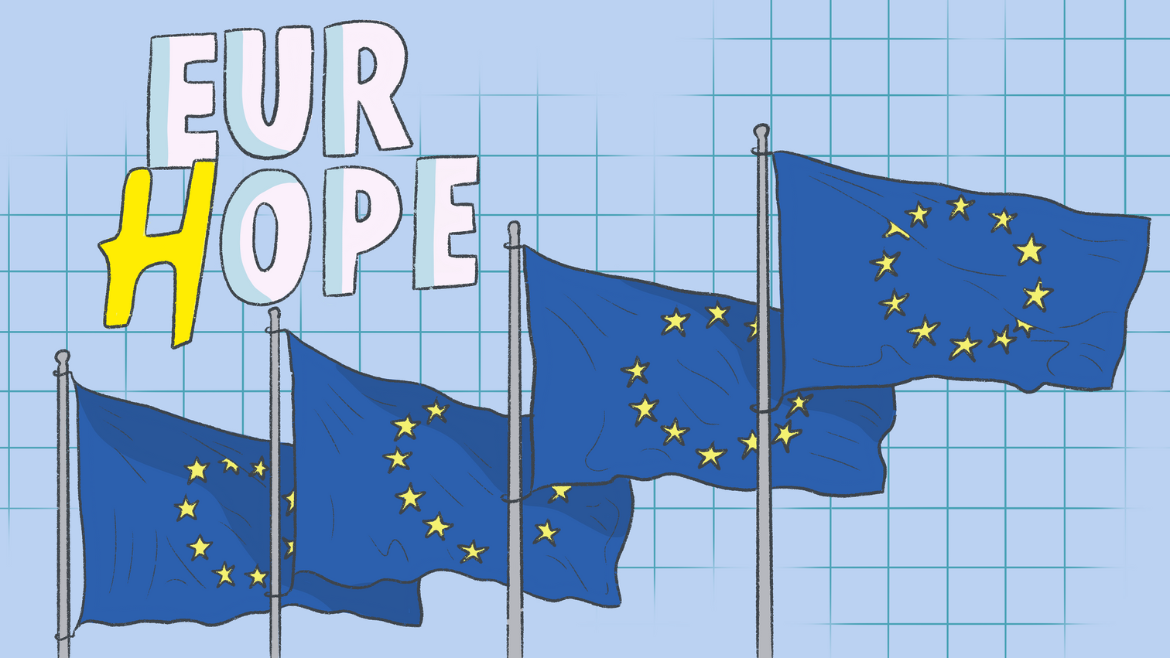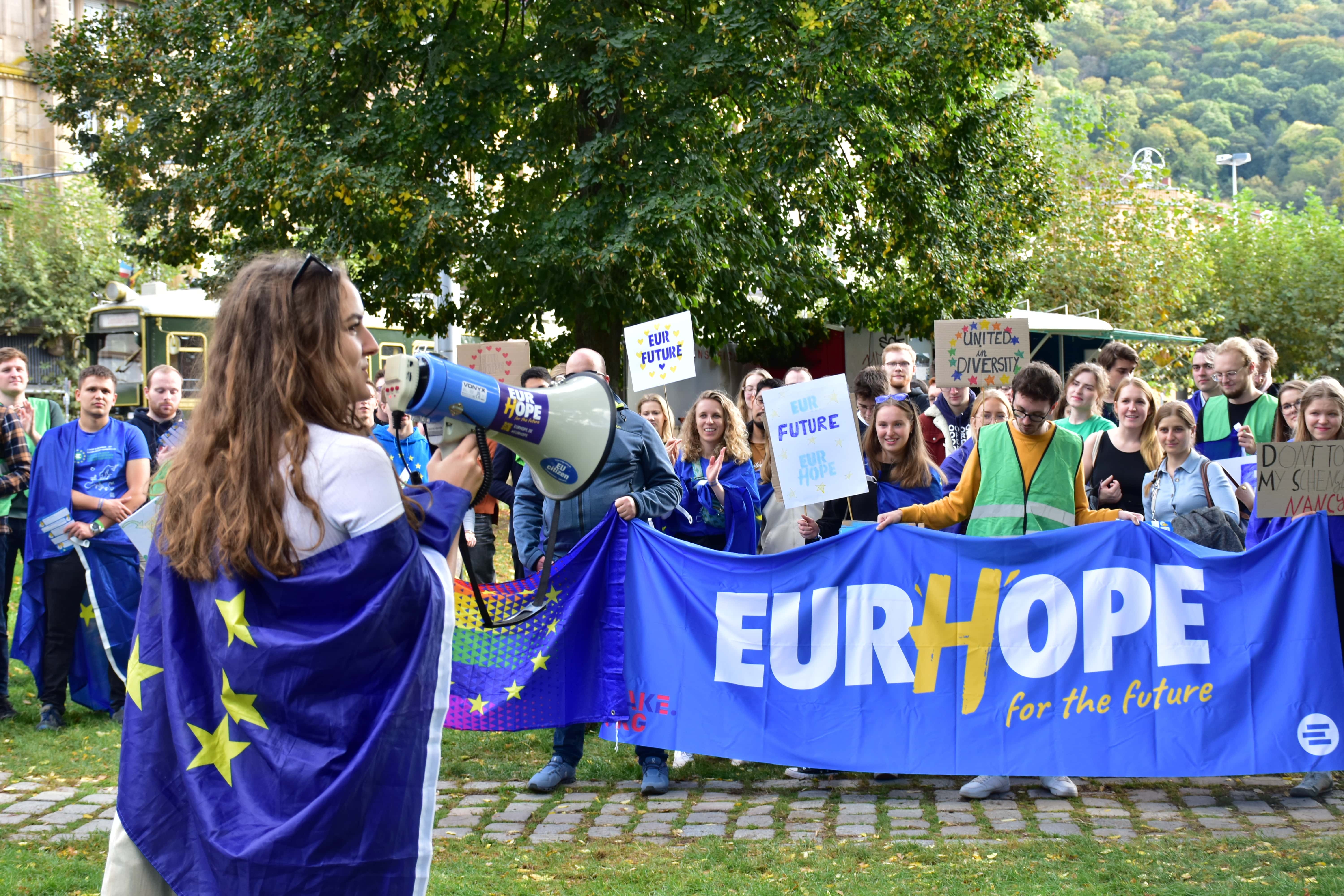
Illustration by Daniela Nunes
EurHope - we define the next chapter
by Judit Lantai
In the 2019 European elections we saw the highest young voter turnout since 1994. What awaits young people and Europe this year, in the 2024 European Elections? Will young people turn up - and how will they vote?
Elections do not start at the ballot box. Whether young people show up to vote and who they give their support to will be a result of many interacting factors, including the tireless commitment of youth workers and youth organisations to promote active participation in democracy. And this is even more crucial in the current moment of global crises that put the principles and value of European democracy under question.
 When was the last time you wondered what would happen if Europe, as the concept we know it today, disappeared?
When was the last time you wondered what would happen if Europe, as the concept we know it today, disappeared?
After two devastating world wars, humanity experienced an era of relative peace where the heart wrenching learnings of hate and violence seemed to have accelerated positive development for Europe and the world. While armed conflict did not disappear, international institutions and agreements were still formed; multilateral decision making started to take root and develop; and peace, human rights, rule of law and democracy agendas evolved with a faster pace than ever before. Of course, this development was still very uneven both in Europe and the world, and had its issues of discriminatory structures, but it was progress nonetheless. Europe especially became a symbol of a unique project of peace, where these four pillars have become inalienable from its concept and identity.
As any researcher, politician, journalist or practitioner would tell you today, this period of democratic development seems to be behind us. Instead, we are now in the era of increasing discrimination, hate and polarisation.
Young people across the world, including also in my organisation, the Young European Federalists (JEF Europe), refuse to accept this. There is trust and commitment to fostering democracy, to participate actively in decision making and to promote human rights, the rule of law and peace. However, we of course cannot deny a worrying tendency in how citizens feel about Europe.
When the European Parliament polled the population of the European Union in 2021, it found that most of the top 10 highest scoring emotions of Europeans were negative. This should mean something to all of us. It provides a realistic landscape of people’s emotions in a multi-crises environment and also lays out the work that needs to be done in the EU to support each other out of such a state.
The main positive emotion on the top of the list, standing out as number two, was: hope.

 And there is a lot to take from hope.
And there is a lot to take from hope.
To showcase this exactly, JEF Europe has launched its campaign, EurHope, together with Make.org and over 40 different institutional, civil society and private partners, in order to promote voting and participation to demand a European future that puts in focus hope over hate. Through a multilingual online platform, we collected more than 5 000 proposals from citizens directly in all 27 EU countries in all official languages, and reached over 1.5 million votes on the online platform. Through thorough analysis and further consultation with civil society organisations the inputs were transformed into the Agenda of Hope. The Agenda explores seven dimensions and 15 priorities, ranging from the reform of EU institutions; economic and social justice; health and education; research and innovation; solving the climate crisis; the role of the EU in the world; all the way to migration. This Agenda serves as both an inspiration and a commitment - it is meant to highlight how important it is to express one’s voice in the European elections. It also shows what European citizens wish to see tackled in the upcoming five years of European decision-making.
The European Parliament still lacks the right to initiative; European elections are still only national; the European Council takes key decisions overriding every other European institution and the Parliament has little or no say in how the finances of the Union go. However, the European Parliament has increased its influence greatly. It operates based on direct elections since 1978; it participates in trialogues of decision-making with the Commission and the Council since 1992; and it paves the way often for both: progress and safeguarding what lies at the foundation of Europe (even if officially the Commission ‘guards the Treaties of the European Union’).
The European Parliament contributes greatly to defining what we are talking about and how: and this is not something to underestimate. What we understand as ‘Europe’ can drastically change during a five-year term, as the constellations and narratives in the European Parliament change.
The question for this key moment remains: do we want a Europe of hope or a Europe of hatred?
We ought to know better this time. And this choice does not start at the polling station.
The choice will be the result of what we have been learning along the way. In an era of dis- and misinformation, echo chambers and continuous crises, the day-to-day commitment of youth workers and youth organisations matters even more. We need to recognise that often the root causes of hate come from fear and precarity, and with the right amount of empathy, support and competence building, most people would not choose hate over peace and prosperity. And there are groups of people providing spaces for learning to support this process on a daily basis.
I often think of all youth activists standing up for democracy, human rights and the rule of law; all youth work practitioners and educators across Europe who do their support work, despite everything; all researchers who help us understand and reverse negative trends; and all policy makers who commit to creating enabling spaces for youth work to flourish. The community created by these actors helps us mitigate the harmful impact of hate based politics and serve as an alarm bell for further deterioration.
Europe has a lot to learn but also a lot to contribute when it comes to transforming conflict into peace and democracy. The next chapter of Europe is created not on the voting day but through the everyday initiatives of active voices that continue to steer Europe in a positive direction. By promoting hopeful alternatives, we support the flourishing of a next chapter for Europe that leaves no one behind, and that tends to everyone’s needs.


Judit is the outgoing Secretary General of JEF Europe, an activist, trainer and the proud guardian of two cats.


